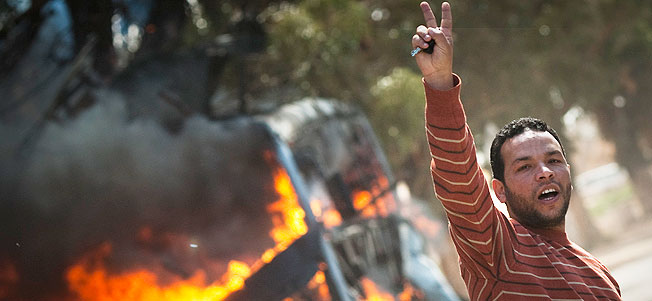Gaddafi has resisted all international calls for him to go and said he will fight to the end, but members of his inner circle have given indications they are ready to negotiate with the rebels, including on the Libyan leader's future.
Gaddafi is still holding on to power, five months into a rebellion against his 41-year rule and despite a NATO bombing campaign and an International Criminal Court arrest warrant for crimes against humanity.
"As a peaceful solution, we offered that he can resign and order his soldiers to withdraw from their barracks and positions, and then he can decide either to stay in Libya or abroad," rebel leader Mustafa Abdel Jalil told Reuters in an interview.
"If he desires to stay in Libya, we will determine the place and it will be under international supervision. And there will be international supervision of all his movements," said Jalil, who heads the rebels' National Transitional Council.
Speaking in his eastern Libyan stronghold of Benghazi, Abdel Jalil, Gaddafi's former justice minister, said he made the proposal about a month ago through the United Nations but had yet to receive any response from Tripoli.
He said one suggestion was that Gaddafi could spend his retirement under guard in a military barracks.
Abdel Jalil's remarks stirred an emotional reaction in Benghazi, with a small protest against any talks with Gaddafi breaking out outside a hotel, and the rebel council playing down any speculation about a widening rift among its leaders.
Abdel Hafiz Ghoga, a council vice chairman, told reporters an arrest warrant issued by the International Criminal Court against Gaddafi had now made any such proposal null and
Meanwhile Turkey, which had close economic ties to Gaddafi before the uprising, pledged $200 million in aid for the rebels Sunday, in addition to a $100 million fund announced in June.
The rebels say they need more than $3 billion to cover salaries and other needs over the next six months.
"Public demand for reforms should be answered, Gaddafi should go and Libya shouldn't be divided," Turkish Foreign Minister Ahmet Davutoglu said in Benghazi.
He added that Turkey saw the rebel council as the people's legitimate representative.
DEADLOCK
The conflict in Libya is close to deadlock, with rebels on three fronts unable to make a decisive advance toward the Libyan capital and growing strains inside NATO about the cost of the operation and the lack of a military breakthrough.
Previous attempts to negotiate a peace deal have foundered, but some analysts say Gaddafi's entourage -- if perhaps not the Libyan leader himself -- may look for a way out as air strikes and sanctions narrow their options.
Gaddafi's daughter Aisha said last week her father would be prepared to cut a deal with the rebels though he would not leave the country.
But his son, Saif al-Islam, rejected calls for his father to quit Libya as the price of peace.
"To tell my father to leave the country, it's a joke. We will never surrender . We will fight. It's our country," he told French TV channel TF1.
"We have to fight for our country and you are going to be legitimate targets for us," he said of Western powers that have led air strikes against Libyan government forces.
In an address to supporters Friday, Gaddafi urged NATO to halt its bombing campaign or risk seeing Libyan fighters descend on Europe "like a swarm of locusts or bees."
Libyan Prime Minister Al-Baghdadi Ali Al-Mahmoudi -- part of a hardline camp which has clashed with Saif al-Islam on policy in the past -- said the Libyan people did not want Gaddafi to go.
"You see everyone, from small children to old men, all of them love Muammar Gaddafi, they all love him," he told Al-Arabiya television channel when asked if the Libyan leader would step down.
Libya's Jana news agency said Sunday Gaddafi had sent a message to German Chancellor Angela Merkel to mark Germany taking over the leadership of the U.N. Security Council, without giving further details. Germany said it had no knowledge of any such a letter.
On the battlefield, both sides continued to slug it out in a fight which has seen many casualties but, for the past few weeks, only small parcels of land changing hands.
A rebel spokesman in Misrata, about 200 km (130 miles) east of Tripoli, said two rebel fighters had been killed on the outskirts of the city, where they are struggling to push back government forces and advance on the capital.
"The (pro-Gaddafi) brigades heavily bombarded Dafniyah and Bourouia last night. Two revolutionaries were martyred and 12 others wounded," the spokesman, who identified himself as Oussama, said from Misrata.
On the front closest to Tripoli, in the Western Mountains region, NATO aircraft dropped leaflets on the government-controlled town of Garyan, warning residents to stay in their homes, said a rebel spokesman called Mohammed.
The alliance last week launched air strikes on the town, which lies on the edge of rebel-held territory.
The rebel spokesman also said there was fighting with heavy weapons Saturday between rebels and government forces around the village of Ghezaya, in the mountains near the border with Tunisia.
AFRICAN PEACE PLAN
Western governments and the rebels had hoped that African Union leaders would use a summit this weekend to join international calls for Gaddafi to quit.
But they did not do that, and also agreed that the African Union's 53 member states would not execute the international arrest warrant for Gaddafi, according to a document seen by Reuters.
While that may irk the West, it does leave open the possibility that Gaddafi could end the conflict by opting for exile somewhere in Africa.
(Additional reporting by Hamid Ould Ahmed in Algiers, Erika Solomon and Isabel Coles in Dubai, Lamine Chikhi in Tripoli, Tarek Amara in Tunis and David Lewis in Malabo; Writing by Christian Lowe; Editing by Angus MacSwan)













